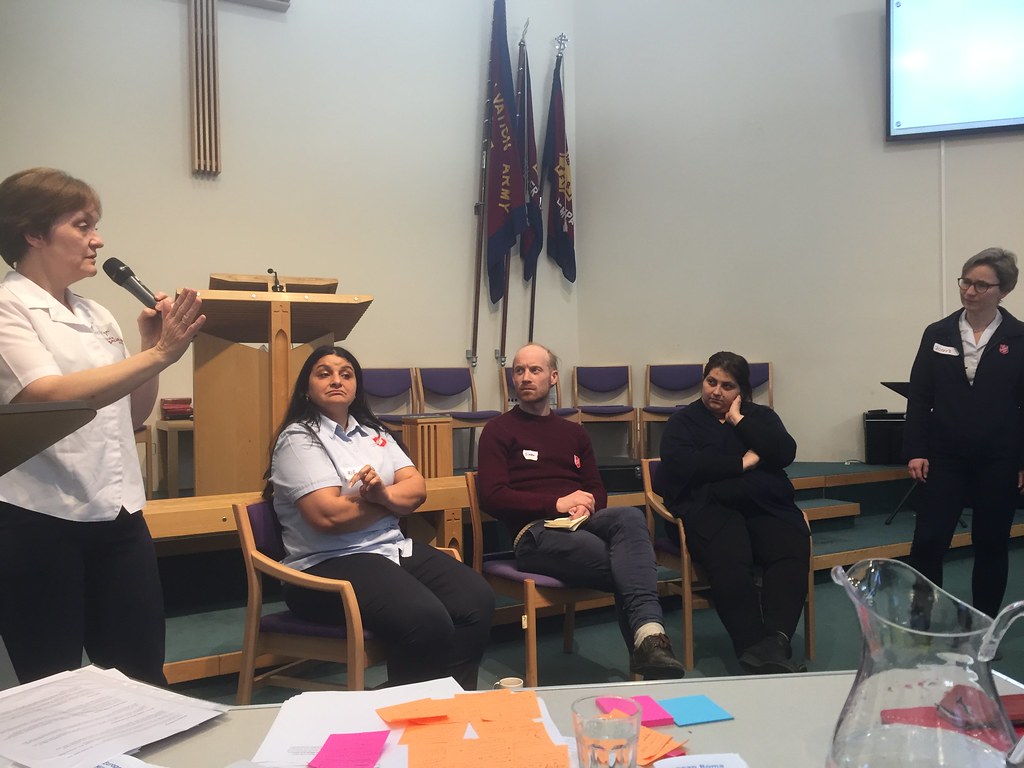The Salvation Army Marks International Roma Day with Call for Improvement in Living Conditions and Inclusivity
TO mark International Roma Day (also called International Romani Day) on Sunday 8 April, The Salvation Army’s EU Affairs Office has published a statement in response to the European Union (EU) framework for National Roma Integration Strategies. It calls on the EU to do more to improve living conditions for Roma people (sometimes known as travellers or gypsies), to increase inclusion and to address ‘institutionalised antigypsyism’.
The statement explains that, motivated by its Christian faith to fight for justice, The Salvation Army ‘has a long history of working with people who are vulnerable, marginalised and exploited across the world ... [It] has a long tradition of work with Roma people, both in their home communities and as EU internal migrants, and effectively employs Roma in the structures of our social services and church ministries, serving therefore as a model of inclusion. To ensure a coordinated approach to its work with Roma in Europe the Salvation Army has recently established a European Roma Mission Network, which includes both Roma and non-Roma members of The Salvation Army.’
It continues: ‘The EU Affairs Office of The Salvation Army applauds the efforts of the European Commission with the EU framework for National Roma Integration Strategies (NRIS), recognising that the Commission efforts and EU funding are a necessary agent for Roma inclusion in EU member states. It also recognises, however, that little progress has been made in the current decade – especially due to institutionalised antigypsyism attitudes, which are embedded in several member states.
‘Institutional prejudices’ against Roma
‘The Salvation Army regrets that the EU framework lacks explicit and measurable goals for the member states. In light of any future action following the end of the EU framework for NRIS, The Salvation Army calls on the European Commission for concrete targets to be achieved through EU guidance in the 10 years following 2020, both at the EU and at national levels, promoting equality in education, employment, housing and health ... As stated by Major Mike Stannett, head of the EU Affairs Office of The Salvation Army: “The conditions in which many Roma live in their communities are poor, with severely restricted opportunities due to public and institutional prejudices that are rarely seen towards other ethnic minorities in Europe.”’
The Salvation Army provides practical support to Roma communities in a number of locations across Europe. In Romania, the Geneza Centres in both Iași and Ploiești support vulnerable young Roma people in numerous ways. In the capital, Bucharest, a ministry team provides food, drinks and medical assistance while also helping Roma and other vulnerable people to keep documentation up to date in order to access other services. In Slovakia, a parent-and-toddler group provides a midday meal to Roma family members who would otherwise go hungry in the divided town of Plavecký Štvrtok, while in Pezinok a new, purpose-built community centre is nearing completion.
Slovakia: The Salvation Army's ministry in Roma communities from Salvation Army IHQ on Vimeo.
European Roma Mission Network
International Roma Day comes only a couple of weeks after The Salvation Army’s European Roma Mission Network gathered in Luton, UK, for their first ever physical meeting. Delegates from 10 European countries were hosted by members of Luton Corps (Salvation Army church) in family homes. For some of the Roma delegates, this was the first time they were welcomed to stay in non-Roma households, and some British couples had never previously hosted people from other European countries, so the impact of the intended bridge-building went beyond the group’s working conversations.
The Roma network and its associated working groups have been collaborating together electronically since May 2017, working on advocacy, Roma leadership development, integrated social actions and bridge-building. This conference was an exciting opportunity for everyone to meet together in one place to consider the achievements to date and to think through the strategy and focus for the months and years ahead.
Chaired by Major Kathryn Blowers (United Kingdom Territory with the Republic of Ireland), the event started with some wider contextual and historical background to ministry among Roma from special guests the Rev Martin Burrell and Commissioner Johnny Kleman (International Secretary for Europe, International Headquarters). Major Blowers encouraged everyone to root their deliberations in God’s Word and to take up the challenge given by God to the prophet Habbakuk to write down his revelation, to make it plain and to run with it (Habakkuk 2:2-3).
The working sessions themselves were blessed with the input of members from a wide variety of backgrounds and experiences – Roma and non-Roma, Salvation Army officers, soldiers and employees. With three official languages for the meeting, and numerous others shared across the meal tables, it was a rich time of sharing.
From reports by the EU Affairs Office and Jo Clark, IHQ
- Photos from the European Roma Mission Network conference can be downloaded from the IHQ Flickr stream: sar.my/romaconf
- Find out more about The Salvation Army's EU Affairs Office

